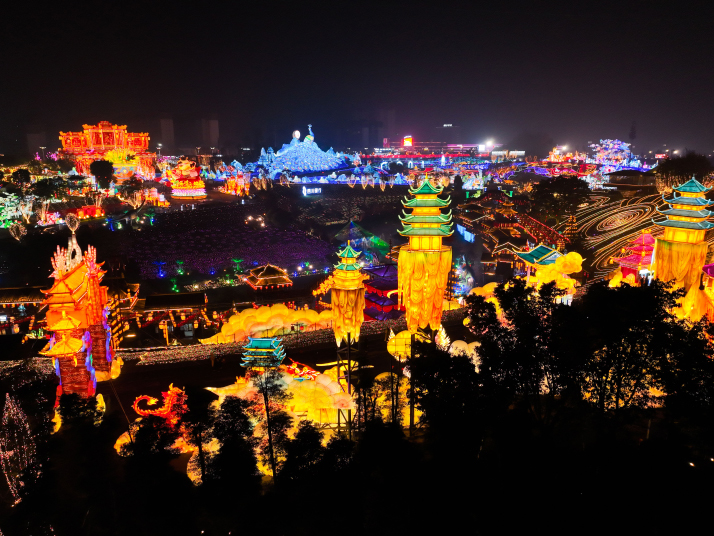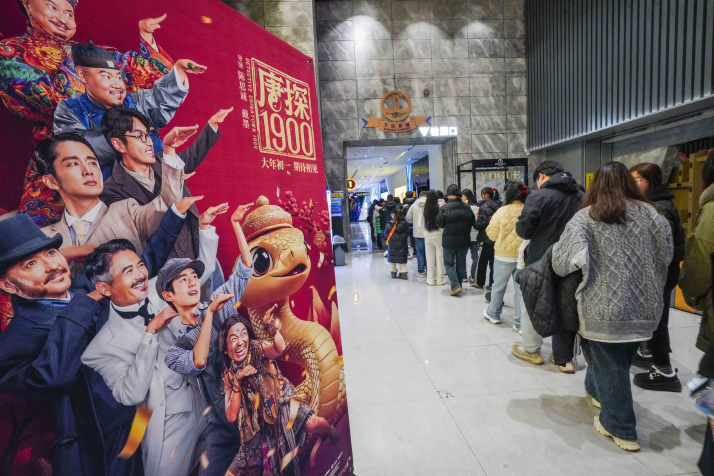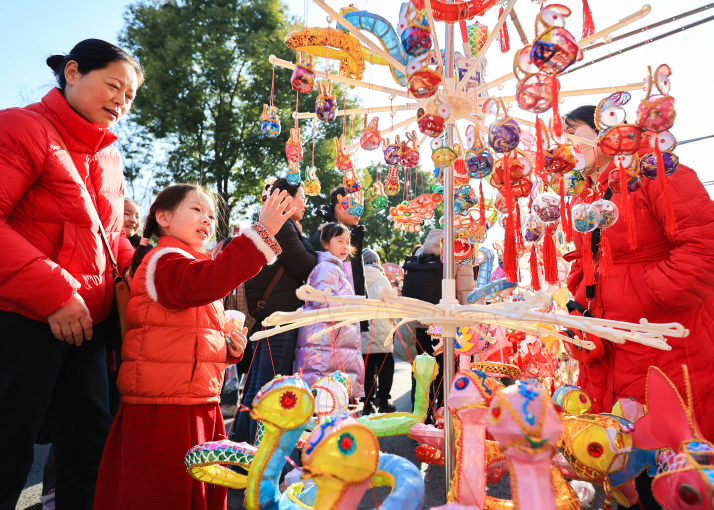| China |
| A festive frenzy | |
|
|
 Huge lantern sets shine at the 31st Zigong International Dinosaur Lantern Festival in Zigong City of Sichuan Province on January 17, creating a dazzling wonderland of light and color (XINHUA)
For 30-year-old Lin Yan, a Beijing-based professional, the Spring Festival has long been a time to escape the icy grip of winter and head to sun-soaked retreats like Sanya, the tropical paradise in China's southern Hainan Province. But this year, she and her husband traded palm trees and ocean breezes for something entirely different: a journey to Yuxian County in Zhangjiakou, Hebei Province, just a short drive from the capital. What drew them in was the county's rich intangible cultural heritage (ICH) and its strong historical charm. Yuxian County, once an important military garrison during the Ming Dynasty (1368-1644), is widely regarded as the birthplace of datiehua, or striking iron flowers. Recognized as a national-level form of intangible cultural heritage in May 2021, this spectacular art form, evolving from the daily practices of blacksmiths, involves splashing molten iron into the air to create dazzling, flower-like patterns of sparks. It is performed during festivals to ward off evil spirits and bring good fortune. Datiehua was just one highlight of Lin's trip. The couple also explored the county's well-preserved ancient architecture and historical relics and sampled local delicacies. The festive atmosphere in the ancient town was palpable, attracting many visitors from Beijing and Tianjin. The surge in tourism was so significant that hotel prices, usually around 160 yuan ($22) per night, rose to 380 yuan ($52)—and were fully booked. "Experiencing datiehua and exploring the ancient town made us feel connected to our roots in a way we never had before," Lin told Beijing Review, claiming the trip was more than just a holiday—it was a journey into the heart of China's cultural heritage. "It's amazing to see how these traditions are being kept alive and celebrated." Cultural fusion This year's Spring Festival is the first one since the event was added to the United Nations Educational, Scientific and Cultural Organization (UNESCO) Intangible Cultural Heritage of Humanity list in December 2024. ICH has become a buzzword for this year's holiday, particularly among younger generations. China currently boasts 44 UNESCO-listed ICH items and over 100,000 national and regional ICH projects, with 1,577 classified as national-level. The country ranks among the top globally in terms of both world and national-level ICH. On January 25, travel portal Tongcheng Travel released the 2025 Intangible Cultural Heritage Spring Festival Travel Map, analyzing ICH travel trends and popular destinations across the country. Data from Douyin, China's version of TikTok, showed that between January 28 and February 3, orders for ICH-related group purchase products surged by 139 percent, with the number of users purchasing these products increasing by 122 percent. Notably, young people drove this trend, with orders from groups born after 1995 and after 2000 reaching 2.6 times last year's levels. Ancient towns and old streets, known for their colorful festive atmospheres, also experienced a surge in tourist activity during the holiday. Online service platform Meituan Travel's data indicated that searches for "ancient town hotels" rose by 228 percent during the 2025 Spring Festival. In addition, lantern festivals across the country, such as the Zigong International Dinosaur Lantern Festival in Sichuan Province in southwest China and the Greater Bay Area Lantern Festival in Guangdong Province, drew massive crowds. On another leading Chinese travel portal Trip.com, searches for "Spring Festival lantern shows" doubled year on year. Figures released on February 5 by the Ministry of Culture and Tourism show that during the eight-day break from January 28 to February 4, trips to domestic tourist attractions increased 5.9 percent year on year to around 501 million. The ministry said that destinations highlighting folk performances were favored by travelers seeking an immersive Chinese cultural experience and a festive atmosphere. Museums also proved popular during the holiday.  Eager moviegoers line up to enter a cinema in Zunhua City of Hebei Province on February 3. Moviegoing is a popular activity during the Spring Festival holiday (XINHUA)
Youth power "Those born after 1990 have become the main force in purchasing New Year goods, with an increasing number of those born after 2000 joining in," Zhu Heliang, Dean of the Brand Research Institute at Beijing University of Technology, told newspaper Guangming Daily, adding that young people are focusing more on wellbeing-related consumption. "They no longer stockpile large quantities of New Year goods. Instead, they opt for rational consumption, seeking cost-effectiveness and practicality. There is a growing preference for domestic products and gifts that feature traditional Chinese cultural elements. Some nostalgic Spring Festival goods are also favored to a certain extent," he said. The material aspects of the Spring Festival are thus diminishing, with more emphasis put on emotional satisfaction and happiness. There is a preference for New Year goods that are well-designed and customized. As pet ownership increases, new Spring Festival consumption trends are also developing within the pet circle, with arranging Chinese New Year's Eve dinners for pets becoming a consumption hotspot. On social media platforms, the business of pet New Year's Eve dinners thrived this year. A pet store in Guangzhou launched a "Puppy New Year's Eve Dinner" package priced at 168 yuan ($23) per dog, including 10 dishes. The slots were quickly filled, and many consumers missed the opportunity to purchase. In addition to dining in-store, various businesses launched New Year's Eve dinner gift boxes for pets, which became a popular choice for pet parents. Most of the hot-selling gift box sets on the market were handmade, with prices ranging from a few dozen yuan ($5) to over 500 yuan ($68), and many consumers are willing to pay for them. Additionally, during the Spring Festival holiday, the business of home pet care, including feeding cats and walking dogs, also boomed. A 29-year-old individual surnamed Zhang, who works in Xi'an and has been raising cats for five years, did not go home this Spring Festival. She took dozens of orders for home pet care services and earned nearly 10,000 yuan ($1,370) over the holiday period. "I've had my cat for five years. In the past, when I went home for the Spring Festival, I too found someone to help feed my cat. Many of those who sought my help this year are my colleagues and friends. Knowing that I have experience in pet care, they trusted me with their pets," she told newspaper Chengdu Business Daily.  A girl, accompanied by her caretaker, selects lanterns at a market close to the Confucius Temple in Nanjing, Jiangsu Province, on January 29, the Chinese New Year (XINHUA)
Digital Spring Festival Artificial intelligence (AI), which developed rapidly in 2024, was also integrated into Spring Festival activities. As AI becomes increasingly user-friendly, many elderly people and children have become active users of it. Most commonly during this year's festival, they used AI to create Spring Festival couplets and generate their own AI digital avatars to make New Year greeting videos. Some provinces, municipalities and autonomous regions used AI to create their own cyber tour guides to interact with users, guiding them and answering questions. There was also a surge in the consumption of digital products. Just before the Spring Festival, a subsidy policy for purchasing smartphones, tablets and smartwatches was implemented nationwide, with the government offering a 15-percent subsidy, up to a maximum of 500 yuan per smartphone. Many people took the opportunity of the Spring Festival to acquire new tech products. According to data from major Chinese online shopping platform Tmall, by the end of January, the transaction volume of smartphones during the first three days of the Spring Festival had increased by more than 50 percent year on year. The "GOODS economy," which is based on the derivatives of copyrighted works such as animations, comics, and games, has also grown rapidly. On January 15, the official online flagship store of the Chinese video game Black Myth: Wukong was launched on Tmall. Within just two weeks, a blanket featuring designs from the game sold over 2,000 units. Watching movies has become a Spring Festival tradition in recent years and this year's film market was particularly strong. On January 29, the first day of the lunisolar year, the box office reached 1.805 billion yuan ($240 million), with 35.1512 million people going to the cinema, setting new records for single-day box office revenue and viewership. According to the National Film Administration, as of 9 a.m. on February 5, the Spring Festival movie season reached a record-breaking box office revenue of 9.51 billion yuan ($1.3 billion), with 187 million viewers. This year's lineup featured a diverse array of genres including mythology, epic, war, action, martial arts, animation, comedy, mystery, and science fiction, catering to a wide range of audience preferences. Among the standout successes was the film Ne Zha: Demon Child Conquers the Sea (Ne Zha 2), which has captivated audiences and dominated the box office since its release on January 29. By the evening of February 5, Ne Zha 2 had surpassed its predecessor and led the global box office, amassing over 5.4 billion yuan ($740 million). This sequel to the 2019 hit Ne Zha 2 not only impressed with its stunning visuals and engaging storyline but also garnered broad appeal, with over 32 percent of viewers attending in groups, often with family and children. "The exceptional box office performance during the Spring Festival holiday has greatly boosted industry confidence," Wang Yichun, Director of Cinema Management Department at Beijing Film Co. Ltd., told Xinhua News Agency. "In recent years, the film industry has faced numerous challenges. The record-breaking box office results for the 2025 Spring Festival not only met, but exceeded expectations, heralding a promising start for the film market in the new [lunisolar] year." BR Copyedited By G.P. Wilson Comments to yuanyuan@cicgamericas.com |
|
||||||||||||||||||||||||||||
|
